Training & Capacity Building - Project examples
-
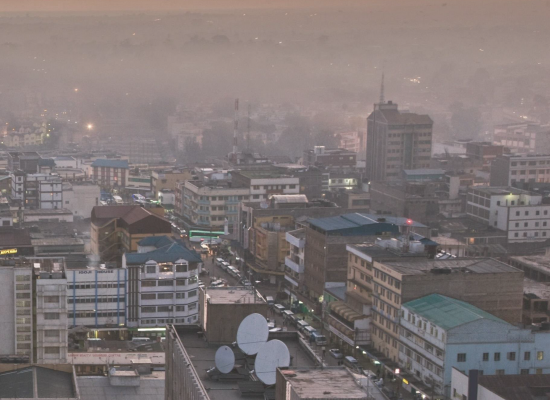
Sierra Leone - Power Sector Roadmap and Coordination Activity
The Power Sector Roadmap and Coordination Activity is one of the components of the Electricity Sector Reform Project of the Sierra Leone Threshold Programme funded by the US Government through the Millennium Challenge Corporation. The Project objective is to support the Government’s efforts in the energy sector as well as advance the power sector reform agenda currently under implementation, and improve the effectiveness and viability of service provision through proper coordination.
The outcomes of this assignment will include the following modules:
Module 1: Define a Sector Roadmap and an Action Plan to Support the Power Sector Reform Process
Module 2: Support the development of a Power Sector Financial Framework
Module 3: Power Sector Reform Action Plan and Advisory Support
Module 4: Private Power Solicitation Framework
intec's services
Module 1: Define Sector Roadmap and Action Plan to Support Power Sector Reform Process
- Map existing power sector roles and responsibilities and perform a gap analysis
- Develop power sector reform roadmap
- Develop action plan for implementation of power sector roadmap
Module 2: Power Sector Financial Framework
- Support start-up of power sector collections account
- Develop power sector financial sustainability plan
Module 4: Develop a Private Power Solicitation Framework (with main focus on solar IPP)
- Process for the solicitation of IPPs
- Elaboration of contractual documents (implementation agreement including concessions and incentives, power purchase agreement (PPA), distribution and transmission agreement, land lease, generation license, and application for relevant environmental clearances)
- Develop a comprehensive IPP framework, defining of roles and responsibilities of the local public stakeholders
- Training in IPP framework
Client
The Government of Sierra LeoneFinancing
Millennium Challenge Corporation (MCC)Period of implementation
01.2017 – 11.2017 -
Zambia - Feasibility Study for Small Hydropower Station
Kafue Gorge Regional Training Centre (KGRTC), established in 1989, provides quality training to regional power utilities. KGRTC intended to develop a small hydropower station at Kafue Gorge with ancillary transmission structures, termination and connection to the grid. The station has been constructed between the existing Kafue Gorge Power Station dam site and the tailrace of the Kafue Gorge Lower Hydropower Station, the size of the SHPP shall be a result of the present feasibility study. The feasibility study led to the preparation of a full basic design and of tender documents for the procurement of an EPC contractor.
intec's services
- Review of existing pre-feasibility studies and related reports
- Hydrological studies and design
- Geological/geotechnical and seismicity investigations
- Selection and assessment of project alternatives and options
- Elaboration of project layouts and plans
- Specification of electro-mechanical equipment
- Design for selected option and cost estimates
- Power evacuation plans and details
- Economic and financial analysis
- Preparation of an Environmental and Social Impact Assessment (ESIA)
- Elaboration of the Feasibility Study Report
- Preparation of tender documents for procurement of an EPC contractor
- Training needs assessment, elaboration of training programme and schedule, conduction of training courses
Client
Kafue Gorge Regional Training Centre (KGRTC)Financing
Swedish International Development Cooperation AgencyPeriod of implementation
6.2015 - 10.2017 -
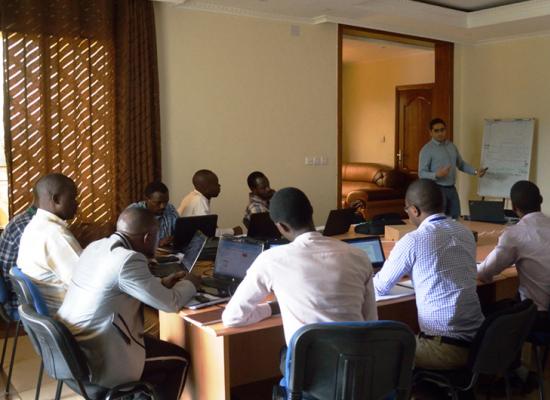
Rwanda - Capacity Building Programs and Technical Assistances to Strengthen the Energy Sector in Rwanda - "Scaling-up Energy Access Project"
To organize, provide and supervise a capacity building program (training, technical assistance, coaching, mentoring, etc.) for the energy sector in Rwanda, especially in the Ministry of Infrastructure (MININFRA), the Rwanda Energy Group (REG) and EARP (Electricity Access Roll-out Program PIU) to develop a strong sector management capacity (at individual, institutional and organizational level) and to improve these institutions’ investment planning, technical, operational, finance and support services functions. The capacity building programs will include advanced long-term, medium and short courses, which will be organized locally or abroad.
intec's services
- Capacity needs assessment of MININFRA, REG and EARP
- Organization, provision and supervision of an extensive training and capacity building program and provision of technical assistance.
Topics of the capacity building and training program include:
- Energy policy, strategy and management: Development of generation resource; renewable energy development; utility restructuring and best practice; regional projects and power pools; system operator and power trading; substation operation and maintenance; strategic planning and M&E,
- Energy development, investment and program implementation: Financial analysis, planning and modelling; bulk power generation and transmission network planning; investment planning and funding; IPP and PPPs, operations and management; asset management; project management; construction and contract management; procurement; environmental issues; monitoring and evaluation; project financial management; strategic maintenance planning, planning and design, GIS, load flows and load forecasting.
The technical assistance covers inter alia:
- Energy efficiency development programs; loss reduction in the electrical network; power trading; regional interconnection, energy planning strategy
Client
Energy Development Corporation Limited (EDCL)Financing
African Development Fund (AfDF)Period of implementation
2015 - 2017
Sierra Leone - Power Sector Roadmap and Coordination Activity
The Power Sector Roadmap and Coordination Activity is one of the components of the Electricity Sector Reform Project of the Sierra Leone Threshold Programme funded by the US Government through the Millennium Challenge Corporation. The Project objective is to support the Government’s efforts in the energy sector as well as advance the power sector reform agenda currently under implementation, and improve the effectiveness and viability of service provision through proper coordination.
The outcomes of this assignment will include the following modules:
Module 1: Define a Sector Roadmap and an Action Plan to Support the Power Sector Reform Process
Module 2: Support the development of a Power Sector Financial Framework
Module 3: Power Sector Reform Action Plan and Advisory Support
Module 4: Private Power Solicitation Framework
intec's services
Module 1: Define Sector Roadmap and Action Plan to Support Power Sector Reform Process
- Map existing power sector roles and responsibilities and perform a gap analysis
- Develop power sector reform roadmap
- Develop action plan for implementation of power sector roadmap
Module 2: Power Sector Financial Framework
- Support start-up of power sector collections account
- Develop power sector financial sustainability plan
Module 4: Develop a Private Power Solicitation Framework (with main focus on solar IPP)
- Process for the solicitation of IPPs
- Elaboration of contractual documents (implementation agreement including concessions and incentives, power purchase agreement (PPA), distribution and transmission agreement, land lease, generation license, and application for relevant environmental clearances)
- Develop a comprehensive IPP framework, defining of roles and responsibilities of the local public stakeholders
- Training in IPP framework
Client
The Government of Sierra LeoneFinancing
Millennium Challenge Corporation (MCC)Period of implementation
01.2017 – 11.2017Zambia - Feasibility Study for Small Hydropower Station
Kafue Gorge Regional Training Centre (KGRTC), established in 1989, provides quality training to regional power utilities. KGRTC intended to develop a small hydropower station at Kafue Gorge with ancillary transmission structures, termination and connection to the grid. The station has been constructed between the existing Kafue Gorge Power Station dam site and the tailrace of the Kafue Gorge Lower Hydropower Station, the size of the SHPP shall be a result of the present feasibility study. The feasibility study led to the preparation of a full basic design and of tender documents for the procurement of an EPC contractor.
intec's services
- Review of existing pre-feasibility studies and related reports
- Hydrological studies and design
- Geological/geotechnical and seismicity investigations
- Selection and assessment of project alternatives and options
- Elaboration of project layouts and plans
- Specification of electro-mechanical equipment
- Design for selected option and cost estimates
- Power evacuation plans and details
- Economic and financial analysis
- Preparation of an Environmental and Social Impact Assessment (ESIA)
- Elaboration of the Feasibility Study Report
- Preparation of tender documents for procurement of an EPC contractor
- Training needs assessment, elaboration of training programme and schedule, conduction of training courses
Client
Kafue Gorge Regional Training Centre (KGRTC)Financing
Swedish International Development Cooperation AgencyPeriod of implementation
6.2015 - 10.2017Rwanda - Capacity Building Programs and Technical Assistances to Strengthen the Energy Sector in Rwanda - "Scaling-up Energy Access Project"
To organize, provide and supervise a capacity building program (training, technical assistance, coaching, mentoring, etc.) for the energy sector in Rwanda, especially in the Ministry of Infrastructure (MININFRA), the Rwanda Energy Group (REG) and EARP (Electricity Access Roll-out Program PIU) to develop a strong sector management capacity (at individual, institutional and organizational level) and to improve these institutions’ investment planning, technical, operational, finance and support services functions. The capacity building programs will include advanced long-term, medium and short courses, which will be organized locally or abroad.
intec's services
- Capacity needs assessment of MININFRA, REG and EARP
- Organization, provision and supervision of an extensive training and capacity building program and provision of technical assistance.
Topics of the capacity building and training program include:
- Energy policy, strategy and management: Development of generation resource; renewable energy development; utility restructuring and best practice; regional projects and power pools; system operator and power trading; substation operation and maintenance; strategic planning and M&E,
- Energy development, investment and program implementation: Financial analysis, planning and modelling; bulk power generation and transmission network planning; investment planning and funding; IPP and PPPs, operations and management; asset management; project management; construction and contract management; procurement; environmental issues; monitoring and evaluation; project financial management; strategic maintenance planning, planning and design, GIS, load flows and load forecasting.
The technical assistance covers inter alia:
- Energy efficiency development programs; loss reduction in the electrical network; power trading; regional interconnection, energy planning strategy
Client
Energy Development Corporation Limited (EDCL)Financing
African Development Fund (AfDF)Period of implementation
2015 - 2017-
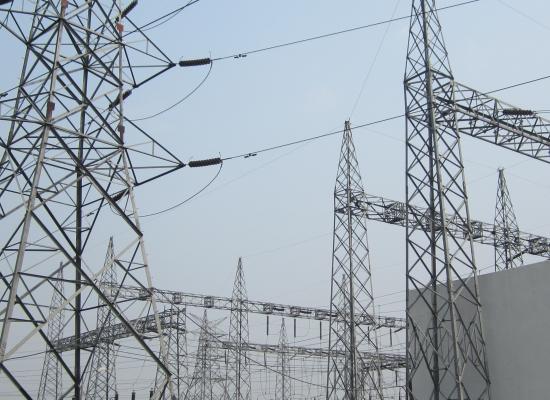
Bangladesh - Feasibility Study of the Transmission System Improvement, Western Zone
Bangladesh is facing chronic power shortage, with an estimated demand gap in the magnitude of 1900 MW and power outages in urban areas of between 5 to 10 hours a day. Taking into account the demand forecast, the current load shedding and the extreme power shortage and operational constraints, PGCB launched the "Power Transmission Improvement Programme" and approached the Government for external sector assistance.
The project covers the following technical measures:
- Construction of 132 kV double-circuit transmission lines and line in-/line outs to substations
- Stringing of a second circuit on an existing 132 kV line and installation of OPGW
- Construction of 230 kV double-circuit transmission lines and line-in/line-out to existing lines
- New construction of three 132/33 kV and one 230/132 kV substations
- Extension of a total of five 132/33 kV and one 230/132 kV substations (1 GIS substation)
intec's services
Feasibility study / technical and economic justification of the planned expansion measures, i.e.:
- network analysis and update of load flow calculations
- assessment of socio-economic benefits
- preliminary line route identification
- preliminary survey of substation areas
- layout and design on feasibility level for the 230 and 132 kV lines, substations and substation extensions
- identification of potential training needs in terms of O&M
- cost estimate, economic and financial analysis of planned measures
- Initial Environmental Examination (IEE) and mitigation measures
- detailed line route survey for 70 km of 230 d.c. line and a total of 85 km of 132 d.c. lines
- full ESIA for the selected technical measures to be implemented and Environmental and Social Management Plan (ESMP)
Tendering of resulting first-priority measures, i.e.:
- design and elaboration of technical specifications
- determination of the bills of quantities
- preparation of the tender dossiers (technical and commercial)
- assistance during tendering
- bid evaluation
- assistance during contract negotiations
for 6 different tender packages (3 substation packages and 3 transmission line packages).
Client
Power Grid Company of Bangladesh Ltd. (PGCB)Financing
KfW EntwicklungsbankPeriod of implementation
01.2014 - 07.2017 -
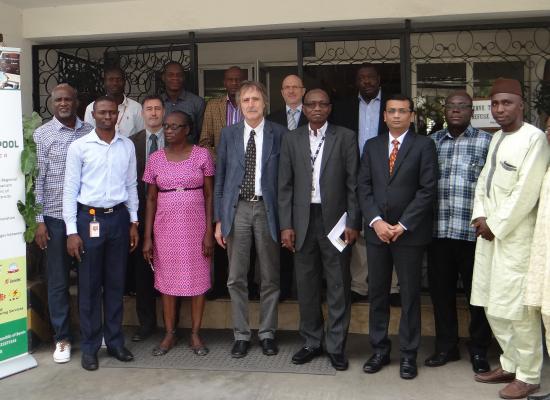
ECOWAS - Reduction of Distribution Losses in the Framework of the GIZ Project "Promoting a Climate-Friendly Interconnected Power System in West Africa"
ECOWAS, the Economic Community of West African states comprises 15 West African countries: Benin, Burkina Faso, Cabo Verde, Côte d'Ivoire, Gambia, Ghana, Guinea, Guinea-Bissau, Liberia, Mali, Niger, Nigeria, Senegal, Sierra Leone and Togo. The overall GIZ project supports the regional dissemination of experience concerning renewable energies and aims at improving the capacities of utilities in the long term. The "electricity distribution" part of the project, together with selected utilities, identifies options for the reduction of distribution losses, implements exemplary measures and disseminates the results in the region.
intec's services
- Task 1: Data collection, review and analysis of current situation in the member utilities: Diagnosis on the prac-tices of loss reduction, catalogue of good practices, proposal of related initiatives/projects for each utility, ex-amination of the adequacy of existing master plans in the distribution utilities and proposal of required updates including costs
- Task 2: Study to quantify system losses: Determination of loss levels by utility, estimate of share of technical losses, preparation of mitigation measures, review of / proposal for energy audit system for each utility, preparation of indicative plans and targets for capital expenditure to reduce overall losses possibly to below 10%
- Task 3: Loss reduction investment plans and cost estimates: development and recommendation of a comprehensive short- and long-term loss reduction investment plan including costs, recommendation of technical measures such as norms, standards and loss management guidelines
- Task 4: Training and capacity building: training needs assessment of utility staff, recommendations for capacity building programs in line with WAPP's capacity building program for member utilities and in coordination with GIZ's capacity building activities of the overall project.
Client
Deutsche Gesellschaft für Internationale Zusammenarbeit (GIZ) GmbHFinancing
Deutsche Gesellschaft für Internationale Zusammenarbeit (GIZ) GmbHPeriod of implementation
04.2015 - 07.2017 -
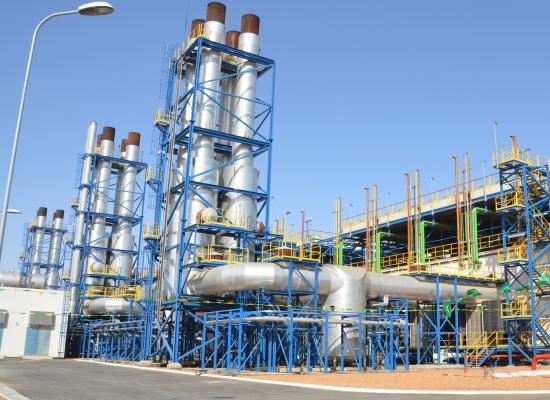
Mauritania - Construction of a 120 (180) MW dual-fuel power plant in Nouakchott
The state-owned utility SOMELEC is currently constructing a new power plant in Nouakchott to answer the steadily increasing power demand in the city and eventually in the national and international grid. This power plant in its initial phase had a capacity of 120 MW (8 x 15 MW dual-fuel gen sets, operated either with HFO or gas). In a second phase, the plant is currently extended to 180 MW capacity by addition of 4 further gen sets.
intec's services
- Choice of site for the power plant
- Review of the existing design report and preparation of tender documents
- Assistance to SOMELEC during tendering, tender evaluation, contract negotiation and contract conclusion
- Follow-up, coordination and control of design studies and manufacturing
- Supervision, monitoring and coordination of site works
- Verification of equipment lists
- Implementation of the training plan for the future operating personnel
- Preparation of tender documents for the power plant access road, follow-up, coordination and control of construction.
Client
SOMELEC - Mauritanian Electricity CompanyFinancing
Arab Fund for Economic and Social DevelopmentPeriod of implementation
08.2011 - 06.2017
Bangladesh - Feasibility Study of the Transmission System Improvement, Western Zone
Bangladesh is facing chronic power shortage, with an estimated demand gap in the magnitude of 1900 MW and power outages in urban areas of between 5 to 10 hours a day. Taking into account the demand forecast, the current load shedding and the extreme power shortage and operational constraints, PGCB launched the "Power Transmission Improvement Programme" and approached the Government for external sector assistance.
The project covers the following technical measures:
- Construction of 132 kV double-circuit transmission lines and line in-/line outs to substations
- Stringing of a second circuit on an existing 132 kV line and installation of OPGW
- Construction of 230 kV double-circuit transmission lines and line-in/line-out to existing lines
- New construction of three 132/33 kV and one 230/132 kV substations
- Extension of a total of five 132/33 kV and one 230/132 kV substations (1 GIS substation)
intec's services
Feasibility study / technical and economic justification of the planned expansion measures, i.e.:
- network analysis and update of load flow calculations
- assessment of socio-economic benefits
- preliminary line route identification
- preliminary survey of substation areas
- layout and design on feasibility level for the 230 and 132 kV lines, substations and substation extensions
- identification of potential training needs in terms of O&M
- cost estimate, economic and financial analysis of planned measures
- Initial Environmental Examination (IEE) and mitigation measures
- detailed line route survey for 70 km of 230 d.c. line and a total of 85 km of 132 d.c. lines
- full ESIA for the selected technical measures to be implemented and Environmental and Social Management Plan (ESMP)
Tendering of resulting first-priority measures, i.e.:
- design and elaboration of technical specifications
- determination of the bills of quantities
- preparation of the tender dossiers (technical and commercial)
- assistance during tendering
- bid evaluation
- assistance during contract negotiations
for 6 different tender packages (3 substation packages and 3 transmission line packages).
Client
Power Grid Company of Bangladesh Ltd. (PGCB)Financing
KfW EntwicklungsbankPeriod of implementation
01.2014 - 07.2017ECOWAS - Reduction of Distribution Losses in the Framework of the GIZ Project "Promoting a Climate-Friendly Interconnected Power System in West Africa"
ECOWAS, the Economic Community of West African states comprises 15 West African countries: Benin, Burkina Faso, Cabo Verde, Côte d'Ivoire, Gambia, Ghana, Guinea, Guinea-Bissau, Liberia, Mali, Niger, Nigeria, Senegal, Sierra Leone and Togo. The overall GIZ project supports the regional dissemination of experience concerning renewable energies and aims at improving the capacities of utilities in the long term. The "electricity distribution" part of the project, together with selected utilities, identifies options for the reduction of distribution losses, implements exemplary measures and disseminates the results in the region.
intec's services
- Task 1: Data collection, review and analysis of current situation in the member utilities: Diagnosis on the prac-tices of loss reduction, catalogue of good practices, proposal of related initiatives/projects for each utility, ex-amination of the adequacy of existing master plans in the distribution utilities and proposal of required updates including costs
- Task 2: Study to quantify system losses: Determination of loss levels by utility, estimate of share of technical losses, preparation of mitigation measures, review of / proposal for energy audit system for each utility, preparation of indicative plans and targets for capital expenditure to reduce overall losses possibly to below 10%
- Task 3: Loss reduction investment plans and cost estimates: development and recommendation of a comprehensive short- and long-term loss reduction investment plan including costs, recommendation of technical measures such as norms, standards and loss management guidelines
- Task 4: Training and capacity building: training needs assessment of utility staff, recommendations for capacity building programs in line with WAPP's capacity building program for member utilities and in coordination with GIZ's capacity building activities of the overall project.
Client
Deutsche Gesellschaft für Internationale Zusammenarbeit (GIZ) GmbHFinancing
Deutsche Gesellschaft für Internationale Zusammenarbeit (GIZ) GmbHPeriod of implementation
04.2015 - 07.2017Mauritania - Construction of a 120 (180) MW dual-fuel power plant in Nouakchott
The state-owned utility SOMELEC is currently constructing a new power plant in Nouakchott to answer the steadily increasing power demand in the city and eventually in the national and international grid. This power plant in its initial phase had a capacity of 120 MW (8 x 15 MW dual-fuel gen sets, operated either with HFO or gas). In a second phase, the plant is currently extended to 180 MW capacity by addition of 4 further gen sets.
intec's services
- Choice of site for the power plant
- Review of the existing design report and preparation of tender documents
- Assistance to SOMELEC during tendering, tender evaluation, contract negotiation and contract conclusion
- Follow-up, coordination and control of design studies and manufacturing
- Supervision, monitoring and coordination of site works
- Verification of equipment lists
- Implementation of the training plan for the future operating personnel
- Preparation of tender documents for the power plant access road, follow-up, coordination and control of construction.
Client
SOMELEC - Mauritanian Electricity CompanyFinancing
Arab Fund for Economic and Social DevelopmentPeriod of implementation
08.2011 - 06.2017-
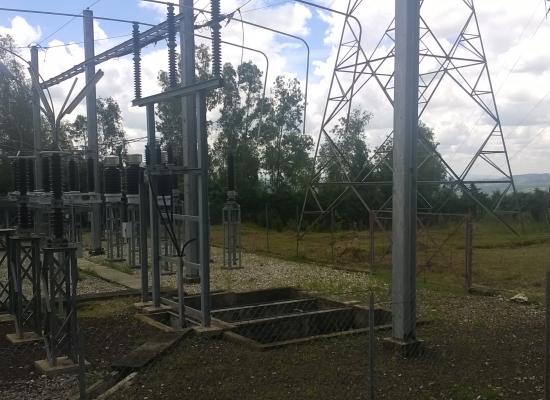
Rwanda, Burundi - Regional Interconnection Project (220 kV Transmission Line Kigoma - Butare - Ngozi - Gitega and 220/110 kV Substations)
The project was part of the NELSAP Regional Transmission Program that aimed at interconnecting five of the Nile Equatorial Lakes Countries, i.e. Burundi, DR Congo, Kenya, Rwanda and Uganda.
The project interconnected the electricity networks of Burundi and Rwanda through the construction of a new 220 kV single-circuit transmission line with a total length of 143 km. The line will initially be operated on the 110 kV level and might later be upgraded to 220 kV.
The project also included the construction of two new 220/110 kV substations, the extension of two existing 110 kV substations and the construction of 11.2 km of 30 kV line for rural electrification of Gisagara (Rwanda).
intec's services
- Review of existing feasibility studies
- Update of the Environmental and Social Management Plan (ESMP)
- Detailed design
- Preparation of complete tender documents for EPC Contractors (2 lots)
- Technical assistance during the procurement process, i.e. tendering, bid evaluation and contract award
- Preparation of a detailed Resettlement Action Plan (RAP) and monitoring of its implementation
- Design approval and supervision of implementation works
- Witnessing of factory acceptance tests, supervision of testing and commissioning
- Certification of Contractor's invoices and payments
- Monitoring and supervision of the implementation of the ESMP
- Safeguarding of project's compliance with KfW's and the World Bank's sustainability guidelines
- Technology transfer and training of employers' and project executing agency's staff
- Representation in the respective project steering and technical committees
Client
REGIDESO (Burundi), Energy Development Corporation Ltd. (Rwanda)Financing
KfW EntwicklungsbankPeriod of implementation
03.2015 - 06.2017 -
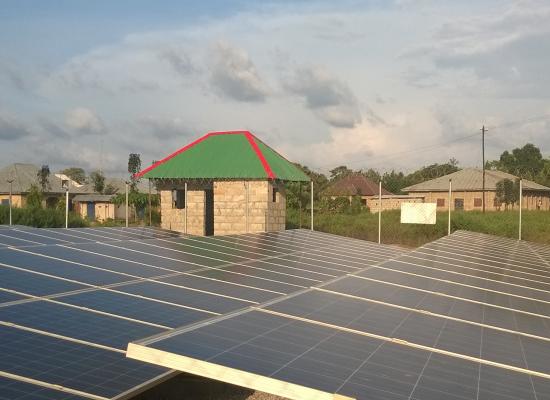
Nigeria - Grid-Connected Solar Power Plant (Feasibility Study & Pre-Feasibility Studies)
In its Roadmap for Power Sector Reforms (2013), Nigeria has articulated its commitment to accelerate economic growth while reducing its GHG emissions, i.a. by introducing renewables to the energy mix. The present project shall contribute to this goal. It includes the following main tasks:
- an in-depth feasibility study including power system integration studies for the development of a 50 MW solar plant at a single site in the State of Bauchi, allowing for modular scale-up and phased development, intended to lead to an investment bid;
- a pre-feasibility study on possible cogeneration feeder plants (20-50 MW) adjacent to existing and upcoming hydropower plants (e.g. Shiro-ro, Jebba, Kainji), grid-connected, centralized and/or distributed, in-tended to lead to functional bids;
- a pre-feasibility study on possible embedded generation plants within privatised DISCOs, grid-connected or distributed, intended to lead to functional bids;
- the preparation of tender documents for EPC;
- a training and capacity building programme.
intec's services
For all three studies, the scope of work includes i.a.:
- site identification and screening
- determination of solar resource
- selection of two best-ranked sites on the basis of technical-economic analyses
- investigation of grid integration and topographical issues
- preparation of an environmental and social management framework
- development of an investment plan
- elaboration of technical concept for the PV plant and the interconnection to the grid
- sensitivity analyses, commercial considerations
- determination of optimum plant sizes and potential for future expansion
- selection of highest-ranked sites and preparation of concept note and design, preliminary topographical survey and geotechnical investigation
In addition, the in-depth feasibility study for the investment bid includes the following services:
- preparation of concept design, drawings, cost estimate and implementation schedule
- comparison of off-take options (bulk trader or sale to DISCO) and feasibility of interconnection policies
- environmental scoping for the selected sites and preparation of ToR for a full ESIA
- preparation of complete tender documents for EPC
- preparation of a deployment and a marketing plan
The pre-feasibility scoping studies have the following additional deliverables:
- investor profiling and ranking, investment and development timelines
- preparation of business plans
- configuration and specification of respective projects and their justification, identification of key milestones, activities, potential partners, etc.
- indicative options for possible ownership and financing (third-party PPA, owner-operated, hybrid financing, capital lease arrangements, etc.)
The project also includes an extensive training, capacity building and dissemination programme, which includes inter alia:
- Seminars and workshops in Abuja on
PV technology, PV project planning in the Nigerian context
Economic and financial analysis of PV power plants
PV power plant basic design, technical specifications, tender documents and ESIA- A one-week study tour to Germany: visits to large-scale PV power plants, research facilities, a regional dispatch centre, a manufacturer of PV modules, project developers, EPC Contractors, etc.
- On-the-job training along all project activities.
Client
Federal Ministry of the Environment, Nigeria Erosion and Watershed Management Project (NEWMAP)Financing
World BankPeriod of implementation
03.2015 - 03.2017 -

Uganda - Interconnection Code & Wheeling Agreement
The preparation of an interconnection code and a wheeling agreement is part of the GET FiT Uganda Program, launched in May 2013 to promote private investment into renewable energy generation projects in Uganda.
The main purpose of program is to fast-track a portfolio of about 20-25 small-scale renewable energy generation projects (promoted by private developers with a total installed capacity of roughly 150 MW). The overall objective of the present assignment is to enable proper and full evacuation of embedded generators in the future, at allowable national and international techno-economic standards.
The project includes detailed technical and economic requirements for connecting generation facilities to the existing grid and will involve both interconnection and wheeling aspects.
For this purpose, the following work packages constitute the framework of the project:
Part A - Work Package 1: Interconnection and Grid Code for fluctuating renewable energy power integration into the grid
Part B - Work Package 2: Wheeling Agreement for fluctuating renewable energy power wheeling
Part C - Work Package 3: Knowledge Transfer Programme.
intec's services
- Development of an interconnection code for fluctuating renewable based power integration based on technical, legal and commercial issues
- Development of a wheeling agreement for wheeling of fluctuating renewable power according to the current policy and regulatory framework
- Development and test of a model for the computation of wheeling losses
- Proposal for wheeler's grid availability performance guarantees and penalty measures for non-compliance
- Development of a knowledge transfer program
- Conducting two workshops on interconnection and wheeling issues.
Client
Electricity Regulatory Authority (ERA)Financing
KfW EntwicklungsbankPeriod of implementation
05.2016 - 01.2017
Rwanda, Burundi - Regional Interconnection Project (220 kV Transmission Line Kigoma - Butare - Ngozi - Gitega and 220/110 kV Substations)
The project was part of the NELSAP Regional Transmission Program that aimed at interconnecting five of the Nile Equatorial Lakes Countries, i.e. Burundi, DR Congo, Kenya, Rwanda and Uganda.
The project interconnected the electricity networks of Burundi and Rwanda through the construction of a new 220 kV single-circuit transmission line with a total length of 143 km. The line will initially be operated on the 110 kV level and might later be upgraded to 220 kV.
The project also included the construction of two new 220/110 kV substations, the extension of two existing 110 kV substations and the construction of 11.2 km of 30 kV line for rural electrification of Gisagara (Rwanda).
intec's services
- Review of existing feasibility studies
- Update of the Environmental and Social Management Plan (ESMP)
- Detailed design
- Preparation of complete tender documents for EPC Contractors (2 lots)
- Technical assistance during the procurement process, i.e. tendering, bid evaluation and contract award
- Preparation of a detailed Resettlement Action Plan (RAP) and monitoring of its implementation
- Design approval and supervision of implementation works
- Witnessing of factory acceptance tests, supervision of testing and commissioning
- Certification of Contractor's invoices and payments
- Monitoring and supervision of the implementation of the ESMP
- Safeguarding of project's compliance with KfW's and the World Bank's sustainability guidelines
- Technology transfer and training of employers' and project executing agency's staff
- Representation in the respective project steering and technical committees
Client
REGIDESO (Burundi), Energy Development Corporation Ltd. (Rwanda)Financing
KfW EntwicklungsbankPeriod of implementation
03.2015 - 06.2017Nigeria - Grid-Connected Solar Power Plant (Feasibility Study & Pre-Feasibility Studies)
In its Roadmap for Power Sector Reforms (2013), Nigeria has articulated its commitment to accelerate economic growth while reducing its GHG emissions, i.a. by introducing renewables to the energy mix. The present project shall contribute to this goal. It includes the following main tasks:
- an in-depth feasibility study including power system integration studies for the development of a 50 MW solar plant at a single site in the State of Bauchi, allowing for modular scale-up and phased development, intended to lead to an investment bid;
- a pre-feasibility study on possible cogeneration feeder plants (20-50 MW) adjacent to existing and upcoming hydropower plants (e.g. Shiro-ro, Jebba, Kainji), grid-connected, centralized and/or distributed, in-tended to lead to functional bids;
- a pre-feasibility study on possible embedded generation plants within privatised DISCOs, grid-connected or distributed, intended to lead to functional bids;
- the preparation of tender documents for EPC;
- a training and capacity building programme.
intec's services
For all three studies, the scope of work includes i.a.:
- site identification and screening
- determination of solar resource
- selection of two best-ranked sites on the basis of technical-economic analyses
- investigation of grid integration and topographical issues
- preparation of an environmental and social management framework
- development of an investment plan
- elaboration of technical concept for the PV plant and the interconnection to the grid
- sensitivity analyses, commercial considerations
- determination of optimum plant sizes and potential for future expansion
- selection of highest-ranked sites and preparation of concept note and design, preliminary topographical survey and geotechnical investigation
In addition, the in-depth feasibility study for the investment bid includes the following services:
- preparation of concept design, drawings, cost estimate and implementation schedule
- comparison of off-take options (bulk trader or sale to DISCO) and feasibility of interconnection policies
- environmental scoping for the selected sites and preparation of ToR for a full ESIA
- preparation of complete tender documents for EPC
- preparation of a deployment and a marketing plan
The pre-feasibility scoping studies have the following additional deliverables:
- investor profiling and ranking, investment and development timelines
- preparation of business plans
- configuration and specification of respective projects and their justification, identification of key milestones, activities, potential partners, etc.
- indicative options for possible ownership and financing (third-party PPA, owner-operated, hybrid financing, capital lease arrangements, etc.)
The project also includes an extensive training, capacity building and dissemination programme, which includes inter alia:
- Seminars and workshops in Abuja on
PV technology, PV project planning in the Nigerian context
Economic and financial analysis of PV power plants
PV power plant basic design, technical specifications, tender documents and ESIA
- A one-week study tour to Germany: visits to large-scale PV power plants, research facilities, a regional dispatch centre, a manufacturer of PV modules, project developers, EPC Contractors, etc.
- On-the-job training along all project activities.
Client
Federal Ministry of the Environment, Nigeria Erosion and Watershed Management Project (NEWMAP)Financing
World BankPeriod of implementation
03.2015 - 03.2017Uganda - Interconnection Code & Wheeling Agreement
The preparation of an interconnection code and a wheeling agreement is part of the GET FiT Uganda Program, launched in May 2013 to promote private investment into renewable energy generation projects in Uganda.
The main purpose of program is to fast-track a portfolio of about 20-25 small-scale renewable energy generation projects (promoted by private developers with a total installed capacity of roughly 150 MW). The overall objective of the present assignment is to enable proper and full evacuation of embedded generators in the future, at allowable national and international techno-economic standards.
The project includes detailed technical and economic requirements for connecting generation facilities to the existing grid and will involve both interconnection and wheeling aspects.
For this purpose, the following work packages constitute the framework of the project:
Part A - Work Package 1: Interconnection and Grid Code for fluctuating renewable energy power integration into the grid
Part B - Work Package 2: Wheeling Agreement for fluctuating renewable energy power wheeling
Part C - Work Package 3: Knowledge Transfer Programme.
intec's services
- Development of an interconnection code for fluctuating renewable based power integration based on technical, legal and commercial issues
- Development of a wheeling agreement for wheeling of fluctuating renewable power according to the current policy and regulatory framework
- Development and test of a model for the computation of wheeling losses
- Proposal for wheeler's grid availability performance guarantees and penalty measures for non-compliance
- Development of a knowledge transfer program
- Conducting two workshops on interconnection and wheeling issues.






